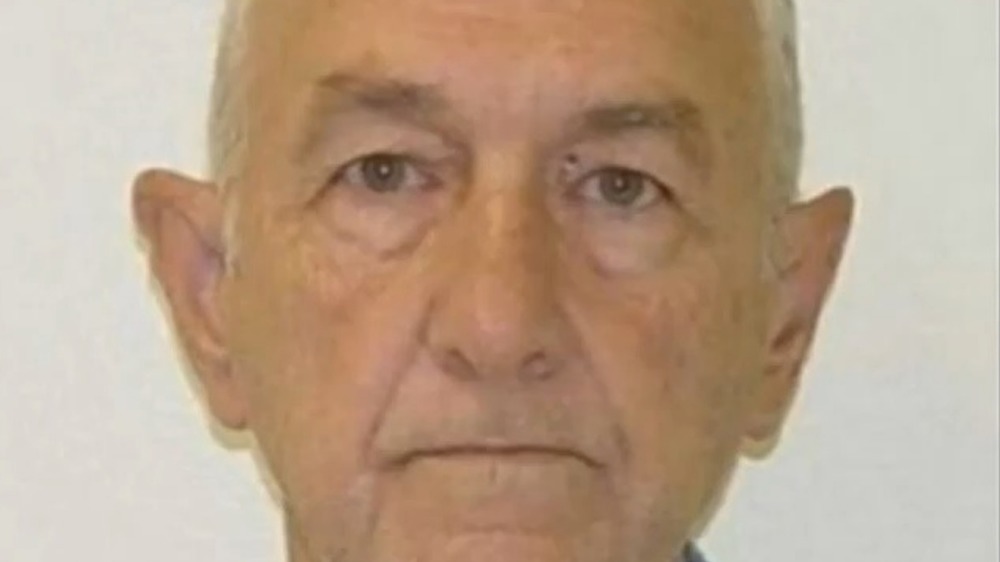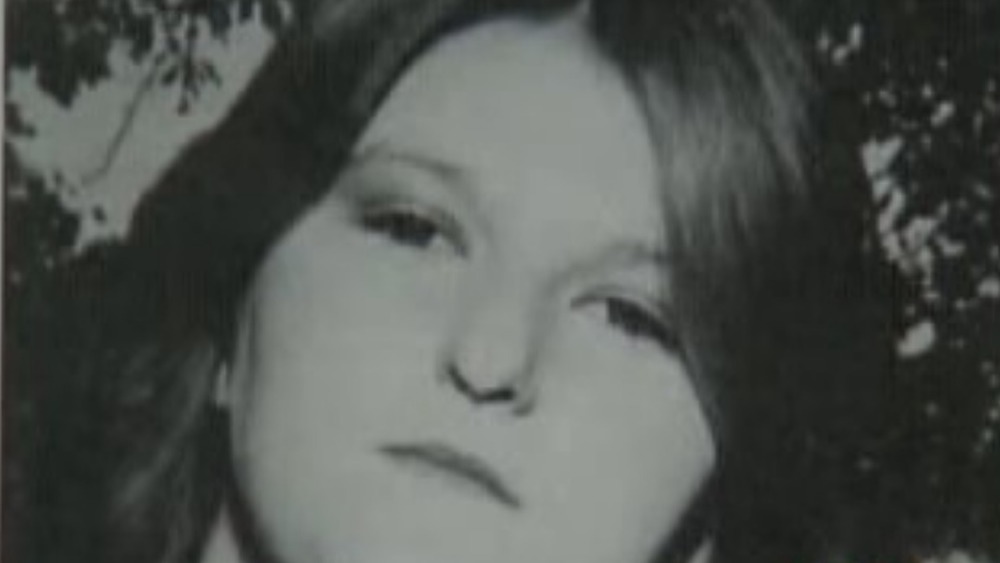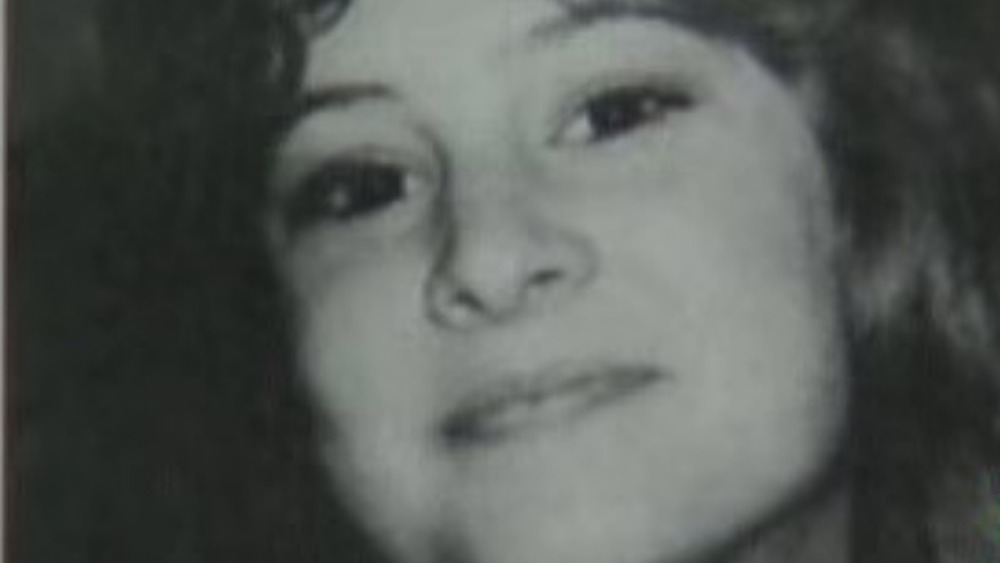The Untold Truth Of The I-5 Strangler
Serial killer Roger Reece Kibbe, nicknamed the I-5 Strangler, was found unresponsive in his cell in Mule Creek State Prison the morning of March 1, 2021. Per CBS Sacramento, a prison guard found Kibbe during an inmate check and brought him to the prison medical center, where he died about 45 minutes later (via YouTube). Kibbe's cellmate Jason Bedrow is suspected of murdering Kibbe and is under investigation, but as of March 3, he'd not yet been charged.
Kibbe started his string of murders in 1977 when he kidnapped 21-year-old Lou Ellen Burleigh of Walnut Creek, California, tied her up, and drove her to Lake Berryessa in Napa Valley where he raped and killed her. Per Claycord News & Talk, Kibbe was "developed" as a suspect, but the case went cold. Burleigh's remains stayed undiscovered until 2002 when San Joaquin District Attorney Investigator David Bertocchini resubmitted DNA evidence from what had come to be known as the Interstate 5 strangler cases from the mid-80s.
By that time, Roger Kibbe was in jail. He'd first been apprehended after luring a woman into his car and assaulting her, as reported by Tru TV. The victim, Debra Guffie, was able to escape and attracted police officers with her screams. They chased Kibbe in his car, arrested him, and charged him with assault.
A long history of suspicious behavior
At the time of Kibbe's arrest, authorities had been searching for the serial killer they'd dubbed the I-5 Strangler for several years. In 1986 and 1987, there were a string of murders that profilers suspected were done by the same person. Stephanie Brown, 19, Charmaine Sabrah, 26, Lora Heedick, 21 (pictured above), and Karen Finch, 25, were all found killed, dragged from one location to another, sexually assaulted, and with their hair cut off and clothes cut off and/or into unusual patterns. All had been strangled but Finch, who was fatally stabbed.
A police officer pulled over Kibbe for a traffic violation shortly after the discovery of Heedick's body on September 6, 1986. The officer took in Kibbe for questioning because he resembled a composite drawing circulating thanks to a description from Heedick's boyfriend who saw her "get into a white two-door car with a fiftyish man," per Tru TV. This was not the first time Kibbe had been questioned regarding a woman's disappearance, and his wife Harriet was reportedly "alarmed." Furthermore, Kibbe's brother was a homicide detective, and apparently, he'd asked his brother for advice on how to handle being investigated. Kibbe "admitted to soliciting prostitutes and mentioned being in several areas that could have put him in contact with the victims" and had cars that matched descriptions of the cars that the murder victims had been seen entering. He became a prime suspect, but since his brother the detective was "unpersuaded of Kibbe's involvement, the investigation became dicey for the cops." Both the investigation and the murders continued.
Kibbe had an early interest in stealing and cutting women's clothes
Just after Kibbe's 1987 arrest for assaulting Debra Guffie, a jogger found the nude body of a young woman who had been strangled to death "with a garrote fashioned of cord with dowels at both ends" with unusual cuts made to her clothes, which were found nearby. The victim was identified as 17-year-old runaway Darcie Frackenpohl, and the details of her crime scene contained several similarities to that of several other women who had been found in the vicinity of Interstate 5.
The ligature around her neck contained fibers from a white nylon cord. The police examined Kibbe's car and found "handcuffs, a battery-operated vibrator, a 6-inch pair of scissors that had cut something adhesive, rubber hair bands, and two 6-inch pieces of wood dowel, one of which had a white nylon cord looped around the end of it." The cord was determined to be used on parachutes, and Kibbe enjoyed skydiving. However, the evidence was still too circumstantial to hold Kibbe. He made bail for his assault charge and went free until his trial.
During the assault trial, Kibbe's troubled childhood came to light — his mother beat him, and bullies teased him for stuttering. Furthermore, authorities learned that Kibbe was, in 1954 and just 15, "charged with petty theft and prowling and referred to a juvenile officer" after it came to light that he was stealing women's clothes from clotheslines, cutting them in "unusual ways," and burying them.
Forensic evidence helped convict Kibbe
Using forensic evidence, authorities set out to link Darcie Frankenpohl to Roger Reece Kibbe, as reported by Tru TV. A fungal spore found on the cord used in the murder matched one found on the floor of Kibbe's car. Fibers removed from Frankenpohl's stockings that had been used to gag her matched fibers from the same car floor. Finally, red paint and tiny black particles found on the cord matched paint and particles found in the car. At this point, Kibbe's homicide detective brother apparently urged Kibbe to confess to Frankenpohl's murder. He was charged and went to trial on February 14, 1991.
The prosecutors presented the circumstances of the murders of Frankenpol, Stephanie Brown (pictured above), Charmaine Sabrah, and Lora Heedick and the assault of Debra Guffie. Karen Finch's murder was left out of the case because she was the only victim to have been stabbed instead of strangled. Despite the evidence connecting Kibbe to the array of cases, he could only be charged with Frankenpohl's death. The forensic evidence, as well as testimony from Guffie and friends of Frankenpohl who saw her get into Kibbe's car, led to Kibbe's conviction on March 18, 1991, and he was sentenced to 25 years to life that May. He was taken to Pleasant Valley State Prison and, according to True TV, said to a guard escorting him to his cell "that he had killed a few women," adding, "What's the big deal?"
Six new charges years later
Kibbe reportedly confessed to his wife shortly after his arrest that he'd killed four women; she claimed to be shocked by this revelation and that her husband had replied that he "didn't know" when she'd asked him why he'd done these horrible things. He also went on to share that his method of picking up victims involved driving up and down the interstate until he found a likely candidate and then driving ahead of her, pretending to be disabled, and preying upon her if she stopped to help. He also targeted sex workers, posing as a customer and luring women into his car (via Tru TV).
The families of the other murdered women kept pressure on a district attorney who was apparently reluctant to try the other cases seemingly connected to Kibbe. Kibbe was first denied parole in 2004, and as his second parole hearing in 2008 neared, new charges were finally brought against him. He was charged with six counts of murder along with "special circumstances" of kidnapping and rape, according to KCRA News, as seen on YouTube. Deputy District Attorney Kevin Mayo told KCRA that they'd interviewed about 80 witnesses before a grand jury delivered the inditement. In addition to Lou Ellen Burleigh, Lori Heedick, Stephanie Brown, and Charmain Sabrah (pictured above), Kibbe was charged with the murders of Barbara Ann Scott and Katherine Kelly Quinones. All of the cases were prosecuted, which meant it was now possible for Kibbe to face the death penalty.
The Strangler died via strangulation
To avoid the death penalty, Kibbe pled guilty to the 1977 murder of Lou Ellen Burleigh and "agreed to help police find Burleigh's body," as reported by the Associated Press via the Daily Press. Kibbe was apparently confused about where he had left Burleigh and his directions didn't lead the authorities to anything. Her remains weren't found until 2011 when Napa County Deputy Sheriff Michael Bartlett, who "took it upon himself to bring some kind of closure to the case," according to the Los Angeles Times, went hiking and searching near Lake Berryessa and eventually pulled a bone out of a creek. Tests proved that the bone came from Lou Ellen Burleigh. Hers was the only body of Kibbe's victims that had never been found.
Kibbe confessed to the murders of all six women; Karen Finch was once again not included in the group even though Kibbe was indeed her killer. Per SFGate, he was sentenced to two life terms without the possibility of parole. It is unknown how many other women Kibbe may have killed in addition to the seven known victims.
On March 3, 2021, ABC 10 reported that a forensic autopsy had determined that Kibbe was, ironically, strangled to death in his cell on March 1, 2021.





